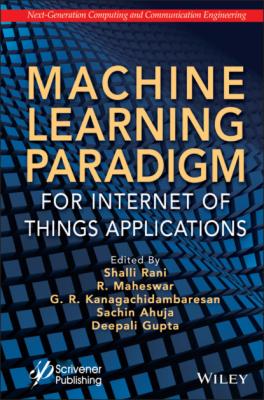Machine Learning Paradigm for Internet of Things Applications. Группа авторов
Читать онлайн.| Название | Machine Learning Paradigm for Internet of Things Applications |
|---|---|
| Автор произведения | Группа авторов |
| Жанр | Программы |
| Серия | |
| Издательство | Программы |
| Год выпуска | 0 |
| isbn | 9781119763475 |
Table of Contents
1 Cover
4 Preface
5 1 Machine Learning Concept–Based IoT Platforms for Smart Cities’ Implementation and Requirements 1.1 Introduction 1.2 Smart City Structure in India 1.3 Status of Smart Cities in India 1.4 Analysis of Smart City Setup 1.5 Ideal Planning for the Sewage Networking Systems 1.6 Heritage of Culture Based on Modern Advancement 1.7 Funding and Business Models to Leverage 1.8 Community-Based Development 1.9 Revolutionary Impact With Other Locations 1.10 Finding Balanced City Development 1.11 E-Industry With Enhanced Resources 1.12 Strategy for Development of Smart Cities References
6 2 An Empirical Study on Paddy Harvest and Rice Demand Prediction for an Optimal Distribution Plan 2.1 Introduction 2.2 Background 2.3 Methodology 2.4 Results and Discussion 2.5 Conclusion References
7 3 A Collaborative Data Publishing Model with Privacy Preservation Using Group-Based Classification and Anonymity 3.1 Introduction 3.2 Literature Survey 3.3 Proposed Model 3.4 Results 3.5 Conclusion References
8 4 Production Monitoring and Dashboard Design for Industry 4.0 Using Single-Board Computer (SBC) 4.1 Introduction 4.2 Related Works 4.3 Industry 4.0 Production and Dashboard Design 4.4 Results and Discussion 4.5 Conclusion References
9 5 Generation of Two-Dimensional Text-Based CAPTCHA Using Graphical Operation 5.1 Introduction 5.2 Types of CAPTCHAs 5.3 Related Work 5.4 Proposed Technique 5.5 Text-Based CAPTCHA Scheme 5.6 Breaking Text-Based CAPTCHA’s Scheme 5.7 Implementation of Text-Based CAPTCHA Using Graphical Operation 5.8 Graphical Text-Based CAPTCHA in Online Application 5.9 Conclusion and Future Enhancement References
10 6 Smart IoT-Enabled Traffic Sign Recognition With High Accuracy (TSR-HA) Using Deep Learning 6.1 Introduction 6.2 Experimental Evaluation 6.3 Conclusion References
11 7 Offline and Online Performance Evaluation Metrics of Recommender System: A Bird’s Eye View 7.1 Introduction 7.2 Evaluation Metrics 7.3 Related Works 7.4 Experimental Setup 7.5 Summary and Conclusions References
12 8 Deep Learning–Enabled Smart Safety Precautions and Measures in Public Gathering Places for COVID-19 Using IoT 8.1 Introduction 8.2 Prelims 8.3 Proposed System 8.4 Math Model 8.5 Results 8.6 Conclusion
